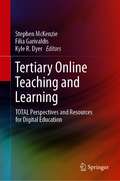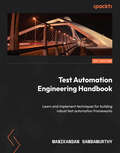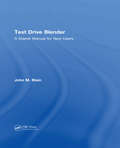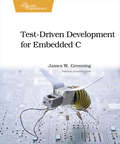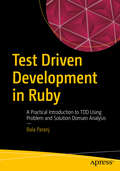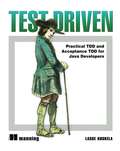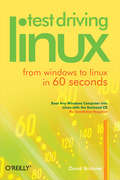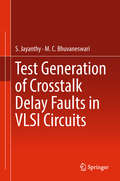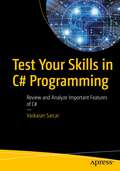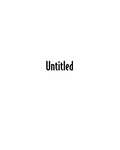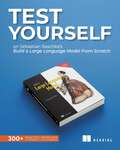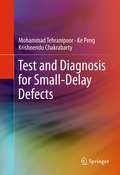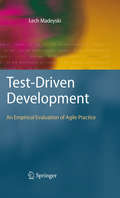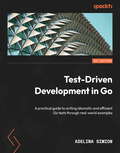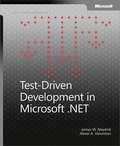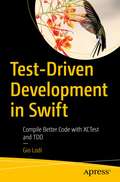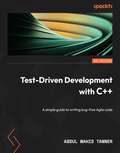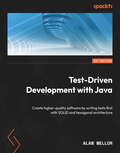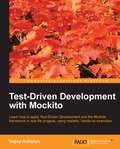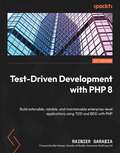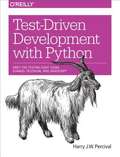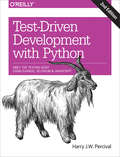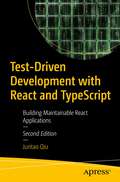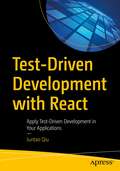- Table View
- List View
Tertiary Online Teaching and Learning: TOTAL Perspectives and Resources for Digital Education
by Kyle R. Dyer Stephen McKenzie Filia GarivaldisThis book is the first comprehensive and integrated guide to online education. It systematically presents all aspects of the emerging “big picture” of online education, providing a broad range of information and insights from online experts, learners, teachers, developers and researchers.The book introduces readers to online education and reveals its potential for bringing about a paradigm shift in education. It describes avenues for increasing the value of the online education medium and examines techniques for improving the online student experience. It also offers a wealth of real-world examples and experiences and shares recommendations on how to improve them, provided by students, teachers, developers, and researchers.Accordingly, the book equips readers – including online learners, teachers, researchers, developers, and administrators – to optimally participate in and contribute to current and future online education advances.
Test Automation Engineering Handbook: Learn and implement techniques for building robust test automation frameworks
by Manikandan SambamurthyUnderstand test automation and implement it in Web, Mobile, and APIs effectivelyKey FeaturesLearn how to automate your tests with the help of practical examplesUnderstand how to bridge the gap between testing and test automationExplore test automation strategies for different platformsBook DescriptionThis book helps you build a better understanding of test automation and aids in bridging the gap between testing and test automation.The book has been divided into three sections with the first section focusing on preparing you for testing and test automation fundamentals. By the end of this section, you'll have an understanding of some common automation terms, definitions, and roles. The second section covers the practical implementation of test automation for mobile, web, API and performance. The third section will help you understand how test automation works with CI/CD, and explore the common issues and pitfalls when executing test automation.By the end of this book, you'll have a better understanding of automation, addressing the common pain points and best practices around test automation.What you will learnGain a solid understanding of test automationUnderstand how automation fits into a test strategyExplore essential design patterns for test automationDesign and implement highly reliable automated testsUnderstand issues and pitfalls when executing test automationDiscover the commonly used test automation tools/frameworksWho this book is forThis book is for manual testers who want to enter the field of test automation and developers who want to learn more about test automation.
Test Drive Blender: A Starter Manual for New Users
by John M. BlainThis book will introduce you to the controls and steer you towards understanding what Blender can do. With this program you can create 3D models of objects and characters. The objects and characters can be placed in scenes. The scenes are captured by camera and rendered into digital images. The objects and characters can be animated and then, again, captured by camera and rendered to video files. Video files can then be compiled into movies. This book will show you how to make the Blender program go through some of its paces and give you an insight into this fantastic world. You will be shown the controls and given operation instructions allowing you to activate a variety of features.
Test Driven Development for Embedded C (Pragmatic Bookshelf Ser.)
by James W. GrenningAnother day without Test-Driven Development means more time wasted chasing bugs and watching your code deteriorate. You thought TDD was for someone else, but it's not! It's for you, the embedded C programmer. TDD helps you prevent defects and build software with a long useful life. This is the first book to teach the hows and whys of TDD for C programmers.TDD is a modern programming practice C developers need to know. It's a different way to program---unit tests are written in a tight feedback loop with the production code, assuring your code does what you think. You get valuable feedback every few minutes. You find mistakes before they become bugs. You get early warning of design problems. You get immediate notification of side effect defects. You get to spend more time adding valuable features to your product.James is one of the few experts in applying TDD to embedded C. With his 1.5 decades of training,coaching, and practicing TDD in C, C++, Java, and C# he will lead you from being a novice in TDD to using the techniques that few have mastered.This book is full of code written for embedded C programmers. You don't just see the end product, you see code and tests evolve. James leads you through the thought process and decisions made each step of the way. You'll learn techniques for test-driving code right nextto the hardware, and you'll learn design principles and how to apply them to C to keep your code clean and flexible.To run the examples in this book, you will need a C/C++ development environment on your machine, and the GNU GCC tool chain or Microsoft Visual Studio for C++ (some project conversion may be needed).
Test Driven Development in Ruby
by Bala ParanjLearn the basics of test driven development (TDD) using Ruby. You will carry out problem domain analysis, solution domain analysis, designing test cases, and writing tests first. These fundamental concepts will give you a solid TDD foundation to build upon. Test Driven Development in Ruby is written by a developer for developers. The concepts are first explained, then a coding demo illustrates how to apply the theory in practice. At the end of each chapter an exercise is given to reinforce the material. Complete with working files and code samples, you'll be able to work alongside the author, a trainer, by following the material in this book. What You Will Learn Carry out problem domain analysis, solution domain analysis, designing test cases, and writing tests first Use assertions Discover the structure of a test and the TDD cycle Gain an understanding of minimal implementation, starter test, story test, and next test Handle refactoring using Ruby Hide implementation details Test precisely and concretely Make your code robust Who This Book Is For Experienced Ruby programmers or web developers with some prior experience with Ruby.
Test Driven: Practical TDD and Acceptance TDD for Java Developers
by Lasse KoskelaIn test driven development, you first write an executable test ofwhat your application code must do. Only then do you write thecode itself and, with the test spurring you on, you improve yourdesign. In acceptance test driven development (ATDD), you usethe same technique to implement product features, benefiting fromiterative development, rapid feedback cycles, and better-definedrequirements. TDD and its supporting tools and techniques leadto better software faster.Test Driven brings under one cover practical TDD techniquesdistilled from several years of community experience. With examplesin Java and the Java EE environment, it explores both the techniquesand the mindset of TDD and ATDD. It uses carefully chosen examplesto illustrate TDD tools and design patterns, not in the abstractbut concretely in the context of the technologies you face at work.It is accessible to TDD beginners, and it offers effective and less wellknown techniques to older TDD hands. Purchase of the print book comes with an offer of a free PDF, ePub, and Kindle eBook from Manning. Also available is all code from the book. What's InsideLearn hands-on to test drive Java codeHow to avoid common TDD adoption pitfallsAcceptance test driven development and the Fit frameworkHow to test Java EE components-Servlets, JSPs, and SpringControllersTough issues like multithreaded programs and data access code
Test Driving Linux
by David BricknerFor years, computer users have put up with the bugs, security holes, and viruses on Windows because they had no choice. Until recently, there has never been a good alternative to Windows. But now, Windows users can switch to Linux, the reliable, secure, and spyware free operating system. Linux is easy to use, runs on almost any PC, and enables you to perform all the tasks you can do with Windows. Getting to know Linux has never been easier, because now there's a way to test-drive Linux without changing, installing, or configuring a thing on your computer. It's called Test Driving Linux: From Windows to Linux in 60 Seconds. This latest release from O'Reilly comes with a Live CD called Move, that allows Windows users to try all the features of Mandrake Linux, a popular Linux distribution without the hassle of actually installing Linux. Users simply place the Move CD into their CD drive, boot from the disc, then watch an entire Mandrake system run on the fly from the CD-ROM. Test Driving Linux: From Windows to Linux in 60 Seconds is a detailed step-by-step guide to the Linux operating system and several popular open source programs. With this guide you can quickly learn how to use Linux to perform the tasks you do most: surf the web, send and receive email, instant message with friends, write letters, create spreadsheets, and even how to enhance your digital photos. Test Driving Linux: From Windows to Linux in 60 Seconds provides both home and business users with a hassle-free way to investigate this operating system before they purchase and install a complete Linux distribution.
Test Generation of Crosstalk Delay Faults in VLSI Circuits
by M. C. Bhuvaneswari S. JayanthyThis book describes a variety of test generation algorithms for testing crosstalk delay faults in VLSI circuits. It introduces readers to the various crosstalk effects and describes both deterministic and simulation-based methods for testing crosstalk delay faults. The book begins with a focus on currently available crosstalk delay models, test generation algorithms for delay faults and crosstalk delay faults, before moving on to deterministic algorithms and simulation-based algorithms used to test crosstalk delay faults. Given its depth of coverage, the book will be of interest to design engineers and researchers in the field of VLSI Testing.
Test Your Skills in C# Programming: Review and Analyze Important Features of C#
by Vaskaran SarcarReview the fundamental constructs in C# using Q&As and program segments to boost your confidence and gain expertise. This book will help you analyze your programs more efficiently and enhance your programming skills.The book is divided into three parts, where you will learn the fundamentals, object-oriented programming, and some advanced features of C#. In the first part, you will review C# and .NET basics along with the important constructs such as strings, arrays, and structures. In the second part, you'll review the concepts of object-oriented programming in detail. Here, you will go through various program segments in class and objects, inheritance, polymorphism, abstraction, encapsulation, and much more. You will also analyze the output of the given programs with the help of Q&A sections. The uses of interfaces, static class, and exception handling are discussed in the book along with some other important concepts in C#. In the third and last part, you will learn advanced features of C# programming such as delegates, events, lambdas, generics, and multithreading. Here, you'll also cover some of the latest features of C#.After reading this book, you will be able to analyze and apply the basic and frequently used features along with the advanced features of C#. What Will You LearnUnderstand the core and some of the latest features in C#Review your programming skills along with some of the latest features in C#Know how object-oriented programming (OOP) is used in C#Get up and running on the advanced features of C# such as delegates, lambdas, generics, and moreWho This Is Book ForProgrammers with basic knowledge of C#
Test Yourself On Build a Large Language Model (From Scratch)
by Curated From Build A Large Language ModelSebastian Raschka&’s bestselling book Build a Large Language Model (From Scratch) is the best way to learn how Large Language Models function. Summary With over 350 pages in seven chapters and five Appendixes, it guides you step-by-step in building an entire large language model similar to GPT-2. It uses Python and the PyTorch deep learning library. It&’s a unique way to learn this subject, which some believe is the only way to truly learn: you build a model yourself. Even with the clear explanations, diagrams, and code in the book, learning a complex subject is still hard. This Test Yourself guide intends to make it a little easier. The structure mirrors the structure of Build a Large Language Model (From Scratch), focusing on key concepts from each chapter. You can test yourself with multiple-choice quizzes, questions on code and key concepts, and questions with longer answers that push you to think critically. The answers to all questions are provided. Depending on what you know at any point, this Test Yourself guide can help you in different ways. It will solidify your knowledge if used after reading a chapter. But it will also benefit you if you digest it before reading. By testing yourself on the main concepts and their relationships you are primed to navigate a chapter more easily and be ready for its messages. We recommend using it before and after reading, as well as later when you have started forgetting. Repeated learning solidifies our knowledge and integrates it with related knowledge already in our long-term memory. What's inside • Questions on code and key concepts • Critical thinking exercises requiring longer answers • Answers for all questions About the reader For readers of Build a Large Language Model (From Scratch) who want to enhance their learning with exercises and self-assessment tools. About the author Curated from Build a Large Language Model (From Scratch).
Test Yourself On Build a Large Language Model (From Scratch): Exercises to Enhance your LLM Learning
by Download Your Free Companion GuideLearn how to create, train, and tweak large language models (LLMs) by building one from the ground up!Sebastian Raschka&’s bestselling book Build a Large Language Model (From Scratch) is the best way to learn how Large Language Models function. It uses Python and the PyTorch deep learning library. It&’s a unique way to learn this subject, which some believe is the only way to truly learn: you build a model yourself. Even with the clear explanations, diagrams, and code in the book, learning a complex subject is still hard. This Test Yourself guide intends to make it a little easier. The structure mirrors the structure of Build a Large Language Model (From Scratch), focusing on key concepts from each chapter. You can test yourself with multiple-choice quizzes, questions on code and key concepts, and questions with longer answers that push you to think critically. The answers to all questions are provided. Depending on what you know at any point, this Test Yourself guide can help you in different ways. It will solidify your knowledge if used after reading a chapter. But it will also benefit you if you digest it before reading. By testing yourself on the main concepts and their relationships you are primed to navigate a chapter more easily and be ready for its messages. We recommend using it before and after reading, as well as later when you have started forgetting. Repeated learning solidifies our knowledge and integrates it with related knowledge already in our long-term memory. What's inside • Questions on code and key concepts • Critical thinking exercises requiring longer answers • Answers for all questions About the reader For readers of Build a Large Language Model (From Scratch) who want to enhance their learning with exercises and self-assessment tools. About the author Curated from Build a Large Language Model (From Scratch)
Test and Diagnosis for Small-Delay Defects
by Mohammad Tehranipoor Krishnendu Chakrabarty Ke PengThis book will introduce new techniques for detecting and diagnosing small-delay defects in integrated circuits. Although this sort of timing defect is commonly found in integrated circuits manufactured with nanometer technology, this will be the first book to introduce effective and scalable methodologies for screening and diagnosing small-delay defects, including important parameters such as process variations, crosstalk, and power supply noise.
Test-Driven Development
by Lech MadeyskiAgile methods are gaining more and more interest both in industry and in research. Many industries are transforming their way of working from traditional waterfall projects with long duration to more incremental, iterative and agile practices. At the same time, the need to evaluate and to obtain evidence for different processes, methods and tools has been emphasized. Lech Madeyski offers the first in-depth evaluation of agile methods. He presents in detail the results of three different experiments, including concrete examples of how to conduct statistical analysis with meta analysis or the SPSS package, using as evaluation indicators the number of acceptance tests passed (overall and per hour) and design complexity metrics. The book is appropriate for graduate students, researchers and advanced professionals in software engineering. It proves the real benefits of agile software development, provides readers with in-depth insights into experimental methods in the context of agile development, and discusses various validity threats in empirical studies.
Test-Driven Development in Go: A practical guide to writing idiomatic and efficient Go tests through real-world examples
by Adelina SimionExplore Go testing techniques and leverage TDD to deliver and maintain microservices architecture, including contract, end-to-end, and unit testingPurchase of the print or Kindle book includes a free PDF eBookKey FeaturesWrite Go test suites using popular mocking and testing frameworksLeverage TDD to implement testing at all levels of web applications and microservices architectureMaster the art of writing tests that cover edge cases and concurrent codeBook DescriptionExperienced developers understand the importance of designing a comprehensive testing strategy to ensure efficient shipping and maintaining services in production. This book shows you how to utilize test-driven development (TDD), a widely adopted industry practice, for testing your Go apps at different levels. You'll also explore challenges faced in testing concurrent code, and learn how to leverage generics and write fuzz tests.The book begins by teaching you how to use TDD to tackle various problems, from simple mathematical functions to web apps. You'll then learn how to structure and run your unit tests using Go's standard testing library, and explore two popular testing frameworks, Testify and Ginkgo. You'll also implement test suites using table-driven testing, a popular Go technique. As you advance, you'll write and run behavior-driven development (BDD) tests using Ginkgo and Godog. Finally, you'll explore the tricky aspects of implementing and testing TDD in production, such as refactoring your code and testing microservices architecture with contract testing implemented with Pact. All these techniques will be demonstrated using an example REST API, as well as smaller bespoke code examples.By the end of this book, you'll have learned how to design and implement a comprehensive testing strategy for your Go applications and microservices architecture.What you will learnCreate practical Go unit tests using mocks and assertions with TestifyBuild table-driven test suites for HTTP web applicationsWrite BDD-style tests using the Ginkgo testing frameworkUse the Godog testing framework to reliably test web applicationsVerify microservices architecture using Pact contract testingDevelop tests that cover edge cases using property testing and fuzzingWho this book is forIf you are an intermediate-level developer or software testing professional who knows Go fundamentals and is looking to deliver projects with Go, then this book is for you. Knowledge of Go syntax, structs, functions, and interfaces will help you get the most out of this book.
Test-Driven Development in Microsoft® .NET
by James W. Newkirk Alexei A. VorontsovWith the clarity and precision intrinsic to the Test-Driven Development (TDD) process itself, experts James Newkirk and Alexei Vorontsov demonstrate how to implement TDD principles and practices to drive lean, efficient coding--and better design. The best way to understand TDD is to see it in action, and Newkirk and Vorontsov walk step by step through TDD and refactoring in an n-tier, .NET-connected solution. And, as members of the development team for NUnit, a leading unit-testing framework for Microsoft .NET, the authors can offer matchless insights on testing in this environment--ultimately making their expertise your own. Test first--and drive ambiguity out of the development process: Document your code with tests, rather than paper Use test lists to generate explicit requirements and completion criteria Refactor--and improve the design of existing code Alternate programmer tests with customer tests Change how you build UI code--a thin layer on top of rigorously tested code Use tests to make small, incremental changes--and minimize the debugging process Deliver software that's verifiable, reliable, and robust
Test-Driven Development in Microsoft® .NET
by Alexei Vorontsov James Newkirk<div xmlns="http://www.w3.org/1999/xhtml"><p>Apply the concepts and techniques of Test-Driven Development to building Microsoft .NET connected applications. Two experts in agile software development demonstrate by example how to use tests to drive lean, efficient coding and better design.</p></div>
Test-Driven Development in Swift: Compile Better Code with XCTest and TDD
by Gio LodiLeverage Swift to practice effective and efficient test-driven development (TDD) methodology. Software testing and TDD are evergreen programming concepts—yet Swift developers haven't widely adopted them. What's needed is a clear roadmap to learn and adopt TDD in the Swift world. Over the past years, Apple has invested in XCTest and Xcode's testing infrastructure, making testing a new top priority in their ecosystem. Open-source libraries such as Quick and Nimble have also reached maturity. The tools are there. This book will show you how to wield them. TDD has much more to offer than catching bugs. With this book, you’ll learn a philosophy for building software. TDD enables engineers to solve problems incrementally, writing only as much code as necessary. By decomposing big problems into small steps, you can move along at a fast pace, always making visible progress. Participate in the test-driven development journey by building a real iOS application and incorporating new concepts through each chapter. The book's concepts will emerge as you figure out ways to use tests to drive the solutions to the problems of each chapter. Through the TDD of a single application, you’ll be introduced to all the staples and advanced concepts of the craft, understand the trade offs each technique offers, and review an iterative process of software development. Test-Driven Development in Swift provides the path for a highly efficient way to make amazing apps.What You'll LearnWrite tests that are easy to maintainLook after an ever-growing test suiteBuild a testing vocabulary that can be applied outside the Swift worldSee how Swift programming enhances the TDD flow seen in dynamic languages Discover how compiler errors can provide the same helpful guidance as failing tests doWho This Book Is ForMid-level developers keen to write higher quality code and improve their workflows. Also, developers that have already been writing tests but feel they are not getting the most out of them.
Test-Driven Development with C++: A simple guide to writing bug-free Agile code
by Abdul Wahid TannerLearn how to write a simple testing framework and extend it to drive the design of your logging libraryKey FeaturesLearn how to solve various challenges when testing in C++ with the help of effective solutionsDevelop a logging library with enhancementsDrive better code designs with effective testsBook DescriptionModern, standard C++ is all that is needed to create a small and practical testing framework that will improve the design of any project. This allows you to think about how the code will be used, which is the first step in designing intuitive interfaces. TDD is a modern balanced software development approach that helps to create maintainable applications, provide modularity in design, and write minimal code that drastically reduces defects. With the help of this book, you'll be able to continue adding value when designs need to change by ensuring that the changes don't break existing tests. In this book, developers working with test-driven development (TDD) will be able to put their knowledge to work by writing a simple testing framework and then using it to drive the design of a logging library. The book will help you enhance your software development skills with test cases. You'll understand how to design and implement test cases. The chapters will also show you how to utilize the TDD approach to be more productive in software development than attempting to code in large unstructured steps. By the end of this book, you'll have gained knowledge of TDD and testing and also built a working logging library.What you will learnUnderstand how to develop software using TDDKeep the code for the system as error-free as possibleRefactor and redesign code confidentlyCommunicate the requirements and behaviors of the code with your teamUnderstand the differences between unit tests and integration testsUse TDD to create a minimal viable testing frameworkWho this book is forThis book is for C++ developers already familiar with and using C++ for daily tasks who want to improve their skillset. You don't need to be an expert but you should already have some knowledge of modern C++ and how to use templates to get the most out of this book.
Test-Driven Development with Java: Create higher-quality software by writing tests first with SOLID and hexagonal architecture
by Alan MellorDrive development with automated tests and gain the confidence you need to write high-quality softwareKey FeaturesGet up and running with common design patterns and TDD best practicesLearn to apply the rhythms of TDD – arrange, act, assert and red, green, refactorUnderstand the challenges of implementing TDD in the Java ecosystem and build a planBook DescriptionTest-driven development enables developers to craft well-designed code and prevent defects. It's a simple yet powerful tool that helps you focus on your code design, while automatically checking that your code works correctly. Mastering TDD will enable you to effectively utilize design patterns and become a proficient software architect.The book begins by explaining the basics of good code and bad code, bursting common myths, and why Test-driven development is crucial. You'll then gradually move toward building a sample application using TDD, where you'll apply the two key rhythms -- red, green, refactor and arrange, act, assert. Next, you'll learn how to bring external systems such as databases under control by using dependency inversion and test doubles. As you advance, you'll delve into advanced design techniques such as SOLID patterns, refactoring, and hexagonal architecture. You'll also balance your use of fast, repeatable unit tests against integration tests using the test pyramid as a guide. The concluding chapters will show you how to implement TDD in real-world use cases and scenarios and develop a modern REST microservice backed by a Postgres database in Java 17.By the end of this book, you'll be thinking differently about how you design code for simplicity and how correctness can be baked in as you go.What you will learnDiscover how to write effective test cases in JavaExplore how TDD can be incorporated into crafting softwareFind out how to write reusable and robust code in JavaUncover common myths about TDD and understand its effectivenessUnderstand the accurate rhythm of implementing TDDGet to grips with the process of refactoring and see how it affects the TDD processWho this book is forThis book is for expert Java developers and software architects crafting high-quality software in Java. Test-Driven Development with Java can be picked up by anyone with a strong working experience in Java who is planning to use Test-driven development for their upcoming projects.
Test-Driven Development with Mockito
by Sujoy AcharyaThis book is a hands-on guide, full of practical examples to illustrate the concepts of Test Driven Development.If you are a developer who wants to develop software following Test Driven Development using Mockito and leveraging various Mockito features, this book is ideal for you. You don't need prior knowledge of TDD, Mockito, or JUnit. It is ideal for developers, who have some experience in Java application development as well as a basic knowledge of unit testing, but it covers the basic fundamentals of TDD and JUnit testing to get you acquainted with these concepts before delving into them.
Test-Driven Development with PHP 8: Build extensible, reliable, and maintainable enterprise-level applications using TDD and BDD with PHP
by Rainier Sarabia Ben HansenA PHP developer's practical guide to planning, writing, and deploying maintainable and extensible software solutions with automated tests in a well-structured wayKey FeaturesLearn to organize and translate business requirements into maintainable softwareMinimize regressions and bugs while releasing new features or bug fixesBuild maintainable applications using SOLID principlesBook DescriptionPHP web developers end up building complex enterprise projects without prior experience in test-driven and behavior-driven development which results in software that's complex and difficult to maintain. This step-by-step guide helps you manage the complexities of large-scale web applications. It takes you through the processes of working on a project, starting from understanding business requirements and translating them into actual maintainable software, to automated deployments. You'll learn how to break down business requirements into workable and actionable lists using Jira. Using those organized lists of business requirements, you'll understand how to implement behavior-driven development (BDD) and test-driven development (TDD) to start writing maintainable PHP code. You'll explore how to use the automated tests to help you stop introducing regressions to an application each time you release code by using continuous integration. By the end of this book, you'll have learned how to start a PHP project, break down the requirements, build test scenarios and automated tests, and write more testable and maintainable PHP code. By learning these processes, you'll be able to develop more maintainable, and reliable enterprise PHP applications.What you will learnUnderstand how to start a software projectDiscover how to use Jira as a tool to organize your tasksExplore when and how to write unit, integration, and functional tests using PHPUnitWrite behavior-driven tests using BehatApply SOLID principles to help you write more testable codeGet the most out of your automated tests by using continuous integrationUse continuous delivery to help you prepare your application for deploymentWho this book is forThis book is for PHP software developers looking to implement TDD and BDD in their projects. An understanding of object-oriented programming is required to get the most out of this book. Professional software development experience will also be beneficial to understand real-life business cases.
Test-Driven Development with Python
by Harry J.W. PercivalBy taking you through the development of a real web application from beginning to end, this hands-on guide demonstrates the practical advantages of test-driven development (TDD) with Python. You'll learn how to write and run tests before building each part of your app, and then develop the minimum amount of code required to pass those tests. The result? Clean code that works.In the process, you'll learn the basics of Django, Selenium, Git, jQuery, and Mock, along with current web development techniques. If you're ready to take your Python skills to the next level, this book clearly demonstrates how TDD encourages simple designs and inspires confidence.Dive into the TDD workflow, including the unit test/code cycle and refactoringUse unit tests for classes and functions, and functional tests for user interactions within the browserLearn when and how to use mock objects, and the pros and cons of isolated vs. integrated testsTest and automate your deployments with a staging serverApply tests to the third-party plugins you integrate into your siteUse a Continuous Integration environment to run your tests automatically
Test-Driven Development with Python: Obey the Testing Goat: Using Django, Selenium, and JavaScript
by Harry PercivalBy taking you through the development of a real web application from beginning to end, the second edition of this hands-on guide demonstrates the practical advantages of test-driven development (TDD) with Python. You’ll learn how to write and run tests before building each part of your app, and then develop the minimum amount of code required to pass those tests. The result? Clean code that works.In the process, you’ll learn the basics of Django, Selenium, Git, jQuery, and Mock, along with current web development techniques. If you’re ready to take your Python skills to the next level, this book—updated for Python 3.6—clearly demonstrates how TDD encourages simple designs and inspires confidence.Dive into the TDD workflow, including the unit test/code cycle and refactoringUse unit tests for classes and functions, and functional tests for user interactions within the browserLearn when and how to use mock objects, and the pros and cons of isolated vs. integrated testsTest and automate your deployments with a staging serverApply tests to the third-party plugins you integrate into your siteRun tests automatically by using a Continuous Integration environmentUse TDD to build a REST API with a front-end Ajax interface
Test-Driven Development with React and TypeScript: Building Maintainable React Applications
by Juntao QiuApply test-driven principles to create scalable and maintainable React applications. This book covers a wide range of topics, including setting up a testing environment and utilizing popular testing frameworks like Cypress, Jest, and the React Testing Library. It also delves into valuable refactoring techniques, as well as enhancing code maintainability and readability. What sets this comprehensive guide apart is its end-to-end project simulation, showcasing how TDD can be employed to build a complete application called "Bookish." Test-Driven Development with React and TypeScript elevates its code examples by leveraging TypeScript, the predominant language in modern frontend development, offering you a deeper understanding of how TDD principles can be applied to React projects. Furthermore, all code examples have been carefully revised and updated for this edition, incorporating reader feedback and reflecting current industry standards.After completing this book, you have the knowledge and skills necessary to develop high quality and scalable React applications. What You Will Learn Master essential refactoring techniques to enhance code qualityEmploy modern practices for writing maintainable React code, including testing and product implementationGain practical experience applying test-driven development (TDD) principles to real-world projects Craft high quality, scalable, and maintainable React applications using TDD principles and techniques Who This Book Is ForWeb application developers who wants to learn how to write high quality code using test-driven development.
Test-Driven Development with React: Apply Test-Driven Development in Your Applications
by Juntao QiuLearn to use accelerated test-driven development (TDD) to build a React application from scratch. This book explains how your React components will be integrated, and how to refactor code to make it more concise and flexible. With TDD you can develop a robust test suite to catch bugs, and develop modular, flexible code. Applying your understanding of how HTML, CSS, and JavaScript work in the browser you'll build a web application called Bookish using TDD and mainstream React stack technologies such as React, React-router, and Redux. Using higher code quality you'll be able to write executable documentation using Cucumber. This is just one of many essentials in maintaining a practical TDD workflow in your daily workload. Test-Driven Development with React highlights best practices and design patterns that will enable you to write more maintainable and reusable React components. What You'll Learn Manage your application’s state using ReduxEmploy professional techniques for backend servicesUse Cypress as an end-to-end testing frameworkUtilize React-testing-library for unit and integration tests Who This Book Is For Ideal for web application developers who wants to learn how to write high quality code using Test-Driven Development.
